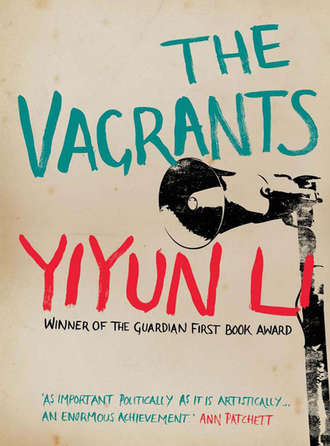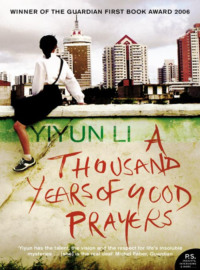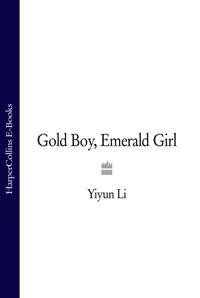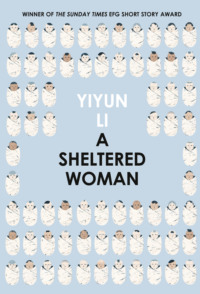
Полная версия
The Vagrants
Nini hugged the baby closer, and Little Sixth ran her hand along Nini’s cheek until the small fingers got ahold of Nini’s ear; she pulled at Nini’s ear, a gesture comforting to both of them.
“I’ve been thinking,” Nini’s mother said after a while, her voice calmer now. “I want to have a perm done tomorrow. Many of my colleagues have had it.”
“Will it be safe for the baby?” Nini’s father asked.
“I’ve checked, and they say it’s safe,” Nini’s mother said. “It’s time for me to look more like a woman than a ghost.”
“You’ve always been the most beautiful woman to me.”
“Who believes your drunken nonsense?” Nini’s mother smiled, and raised her cup to meet the cup of her husband.
BASHI WHISTLED and walked home in long and bouncy strides. Every ten or fifteen steps he saw people gather in front of an announcement, and more were walking along the road to join their work units, holding banners and slogans. His mind occupied with Nini, Bashi did not have time to stop and distract himself by talking with these people. He wondered why the idea had never occurred to him before. For several years, he had seen Nini in the street, hauling baskets of coal from the railway station in the early morning; during the day she went to the marketplace and gathered half-withered vegetable leaves the housewives peeled off before they paid. A despicable creature, he had thought of her then. She was still an ugly thing, but she definitely looked more like a girl now. Twelve years old, Bashi said to himself, savoring the pleasure of saying the sweet number out loud. With all the girls growing up healthily and beautifully in the world, who, besides him, would have thought of Nini as a desirable girl? He whistled, loudly and off-key, a love song from a romantic film in the fifties. Two girls in front of the gate of the middle school pointed at him and snickered, and he smiled back nicely, blowing a kiss to them as he had seen an actor do in a movie that, imported from some eastern European country, was the first foreign film ever shown in Muddy River. Bashi had been impressed with the man’s ease and had practiced the gesture many times in front of his grandmother’s dressing table. The girls walked faster, their faces flushed with indignity, and he laughed and blew another kiss, one of hundreds of kisses he’d blown, and would be blowing, that landed nowhere.
Bashi thought about Mrs. Hua, and then let his thoughts wander to the seven girls the old woman no longer had as daughters. They, although deserted by their parents, must have better faces and bodies than Nini. He wondered why it had never occurred to Nini’s parents to leave her on the riverbank to die when she had been born with that horrible face, or why her parents had kept Nini’s sisters as well, when obviously a son was what they were trying to get, baby after baby. He thought about the daughters that Mrs. Hua had left with other people as child brides. Perhaps that was what he needed, a young girl purchased from someone like the Huas as a future wife. But a thing like that would take some time. Meanwhile, he had Nini to think about, the ugly yet real girl Nini, who would be expecting him soon.
When Bashi got home he found a bamboo steamer on the table, kept warm by a small square of cotton blanket. Underneath, six white buns nestled together, fresh and inviting. He pinched one and was amused to see his fingers leave dents on the smooth crust. He called out to his grandmother that breakfast was ready; hearing no answer, he walked into the bedroom that he shared with her. Both beds had been made, and the curtain between the beds had been pulled back and tied with a ribbon. The curtain had been installed by Bashi two years earlier, when he had learned the exciting things he could do with himself in bed. Not that his grandmother would ever wake up to spy on him, her senses already dull as a rusty knife unearthed from an ancient tomb, but Bashi insisted on the necessity of a curtain, which added pleasure to his secret games.
Bashi took a bite of the bun and walked closer to his grandmother, who was dozing in a cushioned armchair on her side of the bedroom. He put a finger under her nostrils and felt her breath. She was alive. “Get up, get up, lazy piglet. The sun is shining and the house is on fire,” Bashi said, squeezing his voice into that of a woman—his grandmother’s voice when he had been a young boy—and singing, but she did not open her eyes. “Breakfast is ready, and the ants are waiting for your crumbs,” Bashi chanted again. She opened her eyes, nodded briefly, and went back to dozing. He gave up. She was eighty-one and she had the right to indulge herself in anything she liked: short naps in the mornings, a bite now and then, long moments spent sitting and snoozing on a chamber pot. It was no longer safe for her to go to the public outhouse, where people hopped in and out, through the stinky swamp, on boulders and rocks. Someday, Bashi knew, someday he would have to start to take care of her, cooking for her, making her bed, cleaning the chamber pot, cleaning her. He did not fear it. His grandmother had taken care of him all his life, and he would look after her when she needed him. If he was ever to have a baby girl, he would do the same thing for her. If he could find a baby girl now, Bashi thought, he would name the baby Bashiyi, Eighty-one, after his grandmother, the eighty-one-year-old baby. Bashi himself had been named the same way, as he had been born the year his great-grandfather had turned eighty. “Bashiyi,” Bashi said aloud to the room, and thought that only a genius could have come up with the name—it would make the baby girl his sister, as even a fool could see, but the girl would also belong to him. Eighty-one existed only because eighty did, and where would you find Bashiyi without Bashi? He felt the urge to share this thought with someone, but his grandmother was becoming more forgetful by the day; conversation between them was often interrupted by irrelevant comments about events that had happened years or even decades before. Perhaps he could tell Nini. Would she understand him? She looked like a stupid little thing, but people in town had agreed that he himself was dumb. “You never know,” Bashi said, and nodded in a knowing way, as if someone were standing right next to him. “She may be much smarter than you expected.”
Bashi squeezed the rest of the bun into his mouth, and left the house when the clock was striking eight. The main street was in a festive mood. Two men with red armbands were locking up the marketplace. Students from a nearby elementary school were marching and singing a Soviet song, the tune familiar to Bashi’s ears though he had never learned the lyrics, and he could not make out the words while listening to the children, shouting more than singing, their mouths a string of Os. In a side street, two day care teachers were hurrying twelve small children to join the parade, their hands holding a rope with its two ends in the teachers’ hands. The workers from the candy factory, men and women in blue overalls, chatting and laughing, were waiting for the students to pass and two men whistled at a few older girls from the elementary school who probably had been kept back many times and were old enough to be ogling back.
“Where’s the denunciation ceremony?” Bashi asked a policeman at a crossroad.
The policeman pulled Bashi back by his arm and said, “Don’t block the traffic.”
“What harm do I do standing here, comrade?” Bashi said. “Do you see that slogan on the wall? It says serve the people. Do you know who wrote that? Chairman Mao. Is that what you do to serve the people, huh, shout at them and almost break their wrists?”
The policeman turned to look at Bashi. “Who are you?”
“I’m a member of the people whom you serve.”
The policeman retrieved a small notebook from his pocket. “What’s your name? What’s your work unit?”
Bashi tried to make something up, but before he spoke, the policeman turned away to shout at someone who was trying to push through the children’s parade. Bashi shrugged and said under his breath, while he slipped away, “My name is Your Uncle and my work unit is your mother’s bed.”
A few steps later, Bashi asked someone else, and found out that people in this district were all marching toward a high school, one of six sites for the denunciation ceremony before the execution.
“Do you know who the woman is?” Bashi asked.
“A counterrevolutionary,” the man replied.
“I know, but who is she?”
The man shrugged. “What’s that got to do with you?”
“Where do you get the ticket?” Bashi asked.
“Ticket? Go with your school.”
“I’m out of school now.”
“Go with your work unit.”
Bashi thought of explaining that he was a free man, but he stopped midsentence when the man seemed not to be listening to him. Bashi stood and watched men and women, students, and retired workers march by. They all looked happy, singing songs, shouting slogans, and waving colorful banners to the sky. Bashi had never considered the importance of being a member of a unit. He thought of tagging along behind the high school students, but without a banner in his hand, he would look suspicious. After a while, he said to himself, “What’s so special about the denunciation ceremony? I’m going to the island to see the execution itself.”
Once the words were said, Bashi’s mind was made up. Why should he be one of the marching crowds when he had all the freedom in the world to do what he wanted? “Bye-bye,” he said, smiling, and waved at these people who pushed along in the street like a herd of sheep.
FOUR
The East Wind Stadium, built at the peak of the Cultural Revolution, in 1968, and modeled on the Workers’ Stadium in Beijing, though with much less seating capacity, was not an unfamiliar stage for Kai. Several times a year she served as the master of ceremonies, celebrating May Day, the birthday of the Chinese Communist Party, National Day, and achievements of various kinds that the city government decided to honor in mass gatherings. From where she stood, she could not see most of her audience, and she had learned to gauge the attention of fifteen thousand people through her own amplified voice, which, it seemed, could be affected by even the smallest change in the air. Sometimes the echo of her voice came back with a life of its own, vibrant with energy, and Kai knew that she was being watched with admiration and perhaps benign desires, replacing a lover, a wife, or a child in a stranger’s heart, no matter how fleetingly. But these moments had occurred less and less in the past year; more often now she felt like a beggar, her voice lost in an intricate maze and bouncing off cold and uninterested walls.
“Are you nervous?” Han said when they stopped at the side gate. He looked around before touching her face with the back of his hand. Things would be all right, he said. She shook her head without replying. The previous fall, after she had returned to work from her maternity leave, she had lost control of herself onstage at the celebration for National Day. Her choked voice and uncontrollable tears had passed within a minute, and the audience, if baffled by her behavior, had not reacted in any way detrimental to the event. Still, the tears must have been noticed and talked about by the officials sitting closest to the stage as distinguished guests. It must be the hormones, the mayor’s wife commented to Kai at the banquet afterward, and Han’s mother, in a less generous and forgiving mood, warned Kai in front of the other guests not to let a woman’s petty sentiments get in the way of her political duties.
“People will always pay attention to a woman about to be executed,” Han said. Kai looked up at him, taken aback by the simple and cruel truth she had not known he was capable of speaking. Days after the crisis on National Day, Han had asked her what had happened; she had been worrying about the inattentiveness of the audience, Kai lied, knowing that she could never explain to Han or to anyone else the immense desolation that had engulfed her onstage.
Han assured her again that she would not lose her audience today, and Kai nodded and said she had to go into the stadium. He would see her at the banquet, he said, and she looked at the rehearsed curving of his mouth—like a teenager who was very aware of his handsome looks, Han practiced his facial expressions in front of the mirror, smiling, grinning, frowning, and staring—and felt a moment of tenderness. Had Han been born to parents of less status, perhaps the boyish innocence would have made him, in addition to being a good husband and a good father, a good person, but then that innocence might have long ago been crushed by the harshness of life. For the first time that morning, she looked into his eyes and wished him good luck for the day.
“Luck’s always on my side,” Han replied.
Kai left him for the side gate of the stadium. He would be watching her until she disappeared from his sight, and she had to restrain herself from turning to see him and asking his forgiveness. She had, earlier that morning, kissed Ming-Ming with a burst of passion that had surprised the nanny. The girl had retreated to a less noticeable corner of the nursery and waited, with lowered eyes and a stoic face, to take over the position of mothering the baby. Ming-Ming probed Kai’s face with his plump and soft fingers, unconscious of his mother’s love or of her resolution to depart from the world fenced in by that love.
Backstage, people were busy with last-minute preparations. A colleague went over the procedure with Kai, and then invited her to rest in a small room where a mug of fragrant tea was waiting for her. A moment later a secretary of the propaganda department came in and said someone was looking for her at the side gate. Was it Han, Kai asked, and the other woman said that it was not Kai’s husband but a stranger. A secret admirer, the secretary said with a grin, and Kai dismissed the joke, saying that she had no need for an admirer in her life now. The secretary said she would go and tell the man that Kai was already a happy wife and mother if that’s what Kai preferred. Kai thanked her and said no, she would go tell him herself. The secretary was called then to some small task, her laughter trailing her in the hallway. The world could be as trusting and oblivious as an unsuspicious husband.
Across the street from the stadium, Jialin stood under a tree, his gray jacket blending in with the wall behind him. An old Soviet-style cotton cap sat low on his eyebrows, the earflaps let down and tied under his chin; a white cotton mask, the kind worn by men and women alike in Muddy River in the long season of winter, covered most of his face. If not for his glasses, the frames broken and then fixed by layers of surgical tape, Jialin could be as inconspicuous as a worker coming home from a night shift or a shop owner on his way to his cagelike store. Still, it was unlike him to ask to see her in public on this day.
“Is there anything I can do for you?” Kai said. In the world outside the library where they occasionally met, he and she could only act as strangers.
He had come to make sure everything would be all right, he said, and then, caught in a bout of coughing, he turned his face away. She did not know what he meant, Kai replied when his coughing passed, and she wondered if he could catch the falseness in her voice.
“I was wrong to worry, then?” Jialin said. “I wanted to make sure you didn’t have some secret plan to carry out all by yourself.”
“Why?”
“Any premature action equals suicide.”
“I meant why did you think I’d do something without telling you.”
Jialin studied Kai and she did not shy away from his gaze. Behind her she heard a whistle, the security guards shouting at some passerby. Soon she would have to finish this conversation with him; soon she would be expected onstage, and he, already deemed more than half-deceased by the world, would not be in the audience.
“You said something the last time I saw you,” Jialin said, and then shook his head. “I hope I was wrong.”
A revolution required some impulse, was what she had said two weeks ago, when she had been informed of the date set for Gu Shan’s execution. She had come to his shack, an unplanned visit. It’s time for them to act, she said, her hope to save Gu Shan’s life transforming her into a more passionate speaker than she had been after leaving the theater troupe. The masses had to be motivated, public attention had to be drawn to the case; with the right action they should be able at least to impede the execution, if not reverse the sentence. The whole time she was talking, Jialin listened with a frown. It was an impulsive and unwise proposal, Jialin said afterward, and for the first time they argued.
“I want to act as much as you do,” Jialin said now.
Kai looked at his eyes behind the glasses. They seemed perplexed, as if he could not find the right words. Outraged by his reasoning, which she had not been able to argue against, she had called him a coward that afternoon two weeks ago. He was closer to his grave than most people he had known in this world, Jialin replied then, and it was not his life or his death he was concerned about but choosing the right time. The statement was delivered with a cold anger that she had not known existed behind his calm gentleness, and Kai had to leave his shack without an apology. He had informed her of his condition when they had first met, six months earlier, but afterward the tuberculosis had never been brought up. Jialin was four years older than Kai, but his ailment made him ageless, a fact that Kai was aware of when she decided to befriend him; it must have occurred to him too, she imagined—that as a dying man he was exempted from many social rules—when he first wrote her a letter that, with its talk about democracy and dictatorship, could have led him to prison. She was baffled by his faith in a stranger, a woman whose voice represented, more than anything, the government in Muddy River, though she never asked him why he had chosen to entrust not only his idealism but also his life to her in the first place. Despite their fast friendship they had few opportunities to talk in person. In their letters to each other, they focused only on political topics and social changes, sharing little about their lives.
“Why did you think I would act on my own?” Kai asked again.
He hoped he was wrong, Jialin said, but it was a feeling that he might regret later had he not come to talk to her this morning. His intuition was not wrong, Kai thought of telling him: She had decided, since they had parted the last time, to carry out her own plan; reserved as he was, she had hoped that once she initiated a public outcry at the denunciation ceremony, he and his friends would have to choose action. Like a child forced to banish his mother from his world before she turned her back on him, Kai thought that she had prepared herself for a day, a battle, a life without Jialin. That he would sense her decision and come to stop her both moved and frightened her.
Jialin studied her. “Have you already started something I don’t know?”
“No.”
“And are you thinking about starting a protest without telling me?” he said. “Am I right to worry?”
A few people walked past them in the street, and both Jialin and Kai remained silent for a moment. A bicycle bell clanked impatiently, followed by a crashing noise. Neither looked away to search for the accident.
She had seen his face only once, when she searched for his address on his letter one early afternoon. The letter, delivered to the mailbox that bore her name outside the propaganda department, had caught her eye among the fan letters expressing admiration for her performance at various events or commentaries, which the letter writers hoped would be chosen and read aloud by her in the program: The handwriting on the envelope reminded her of an older man of her father’s generation who had devoted himself to the lifelong practice of calligraphy, and out of curiosity she singled it out before passing the others to a secretary in the propaganda department.
He answered her knock on the gate with a familiar greeting that afternoon six months earlier, and later she would guess rightly that she was not his only visitor. She pushed the gate open and let herself into a small yard, and after a while, he came out of a low shack and was surprised that she was not whom he was expecting. He was a tall man, much younger than she had pictured, his face pale and thin. As he spoke he broke from time to time into a bout of coughing, and his face would take on an unhealthy red color. He did not invite her into his shack that first time. Please come with masks and gloves next time, he said to her; when they knew each other better he suggested that they meet in the reading room of the only public library in town.
“I know I can’t keep you here for long,” said Jialin now, when no one was within earshot. “But can you at least promise me not to do anything before we talk again?”
The pleading tone was unfamiliar to Kai; between the two of them he had always been the confident one. Sometimes Kai had to rewrite a letter many times for fear that she would let him down.
“Sooner or later we have to give up what we have for what we believe, no?” Kai asked.
“We don’t sacrifice ourselves for any irrational dream.”
“So we’ll let Gu Shan sacrifice for us?” Kai said. She wondered if Jialin would find her passion unwise and childish, as he had indicated two weeks earlier. But it was not a disagreement with his principle but more of a sense of failing that made her question him. They had done nothing to save Gu Shan’s life, she said now; would they also just let her die without waking the public up to the injustice? He was not wrong that she was planning to act on her own, she said; she had her microphone and she had her voice.
Someone called her name, and Kai turned around and saw the secretary waving at her and then pointing out Kai and Jialin to the security guards. She had to go, Kai said. Could she at least think over his words before doing anything, Jialin asked, but Kai, having little time to answer, left him without the promise he was hoping for. The guards looked at her with concern when she crossed the street. One of those people who was determined to discuss political issues with her, Kai said when the secretary asked her, and no, they might as well leave him alone, she said to the guards.
SOMEDAY, SHE WOULD LOSE her oldest son, Jialin’s mother thought when she left his breakfast on the tree stump that served as a table. Apart from the tree stump, a chair, and a narrow cot, there was no other furniture in the shack. A heater made out of a gas can, which Jialin’s mother filled three times a day with hot water, kept the shack slightly warmer than outside, and dampness clung to the sheet and quilt all year round. On one side of the shack there were piles of books placed on flattened cardboard boxes, a plastic sheet underneath. A shoe box of wires, tubes, and knobs—his radio, as Jialin had called the crudely assembled thing—sat on his cot, and a pair of headphones, a skeleton of wires and metal rings, sat alongside.
Jialin was not in the shack, and she wondered where he could be on this morning. He did not leave home often, and she was almost happy that she had a moment alone in his shack. When he was around he was polite; he thanked her for the food and hot water and clean laundry she brought over but he did not invite her to sit down. That Jialin was someone she would never understand was a fact she had long ago accepted, but like all mothers whose children are growing up and drifting away from them, she felt an urge to stay in his shack as long as she could, to cling to anything that she could use, when he vanished from her life, to reconstruct a son from memory. She picked up a book and flipped to a random page; someone had underlined the paragraph with thick red and blue marks—Jialin perhaps, or the previous owner of the book, but she would prefer to think that the book had no history but belonged entirely to her son. She looked at the words that she could not read—she was illiterate, and it was for that reason, Jialin believed, that she had been assigned as an undertaker of banned books in the factory that produced paper products. He had begged her to save some of the books for him; he had by then been ill with tuberculosis for a year, and a son isolated from the world was enough to turn a mother into a petty thief. Every day she took a book or two from the piles to be pulped and hid them under her clothes. The books came home with her body temperature. His face brightened when he saw the books, and for that rare happiness she, an honest woman who had not cheated a soul in the world, never regretted her crime.






